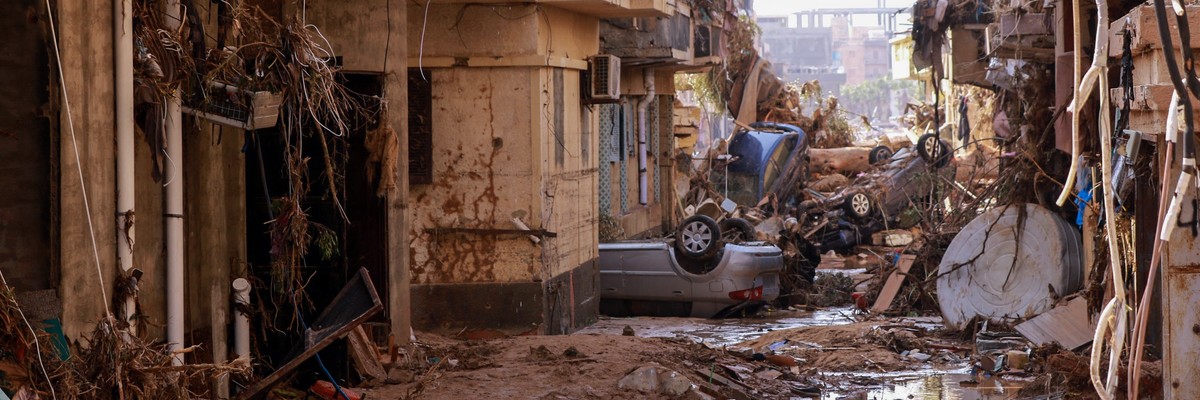The Interior Ministry in eastern Libya said Tuesday that the confirmed death toll in flooding from Storm Daniel has risen past 5,200, with at least 10,000 people feared missing and at least a quarter of the Mediterranean port city of Derna destroyed, according to officials.
"Bodies are lying everywhere—in the sea, in the valleys, under the buildings," Civil Aviation Minister Hichem Chkiouat
told Reuters on Tuesday. "I am not exaggerating when I say that 25% of the city has disappeared. Many, many buildings have collapsed."
Health Minister Othman Abdel Jalil
told reporters that ultimately the number of deaths is expected to reach 10,000 following Daniel's torrential downpour, which caused floodwaters to breach Derna's two dams over the weekend.
The water reached as high as 10 feet in some parts of the city, witnesses told
Reuters, washing away "entire neighborhoods" into the sea in just the latest of the extreme weather disasters that have devastated cities and killed thousands of people in recent months across the globe, as scientists have warned that extreme rainfall, heatwaves, and wildfires are being driven by the climate crisis and the extraction of fossil fuels.
The United Nations
warned in 2020 that low-lying coastal areas of Libya are at an elevated risk for climate-related disasters as water in the warming Mediterranean Sea expands, causing sea levels to rise approximately 2.8 millimeters (0.1 inches) per year.
Storm Daniel also killed 15 people in Greece before making its way south to Libya; according to one expert at Britain's University of Reading, such Mediterranean hurricanes—or medicanes—could become more deadly as the planet continues to grow hotter due to the emission of heat-trapping gases.
"There is consistent evidence that the frequency of medicanes decreases with climate warming, but the strongest medicanes become stronger," meteorology professor Suzanne Gray
told Reuters.
Christos Zerefos, secretary general of the Academy of Athens and head of the institution's climatology research center, told the outlet that the rainfall that preceded the flooding was "unprecedented" for the North African country, with more rain dumped on Libya than ever recorded since data-collecting began in the mid-19th century.
"We expect such phenomena to happen more often," he
told Reuters.
The disaster was made worse in Derna by ongoing political turmoil in the country since a 2011 political uprising, with two separate governments overseeing the east and the west.
Hani Shennib, president of the National Council on U.S.-Libya Relations,
told Al Jazeera that "the east has been neglected," with Derna's dams eroding and few health services to serve the city of 100,000 people.
"I have visited Derna quite frequently. I have been shocked that a city of 100,000 people does not have a single hospital that is functioning," Shennib told
Al Jazeera. "The only hospital that is functioning in Derna today is a rented villa that has five bedrooms providing the services to the population. This is not new. This is going on for 42 years. It has caused the alienation and political turmoil since the days of [late longtime ruler Muammar] Gaddafi."
Grassroots climate movement Extinction Rebellion Global noted that, as campaigners have long warned, people in cities where public services "have collapsed" are uniquely vulnerable to climate catastrophe.
The devastating floods came just over a week before world leaders are scheduled to meet in New York for the United Nations Climate Ambition Summit, where U.N. Secretary-General António Guterres has called on them to present updated commitments to reduce fossil fuel emissions and climate action plans, warning last week that recent extreme weather
shows "climate breakdown has begun."
"Governments must act now,"
said Greenpeace International, "to end fossil fuels that are plunging us deeper into climate disaster every day."
